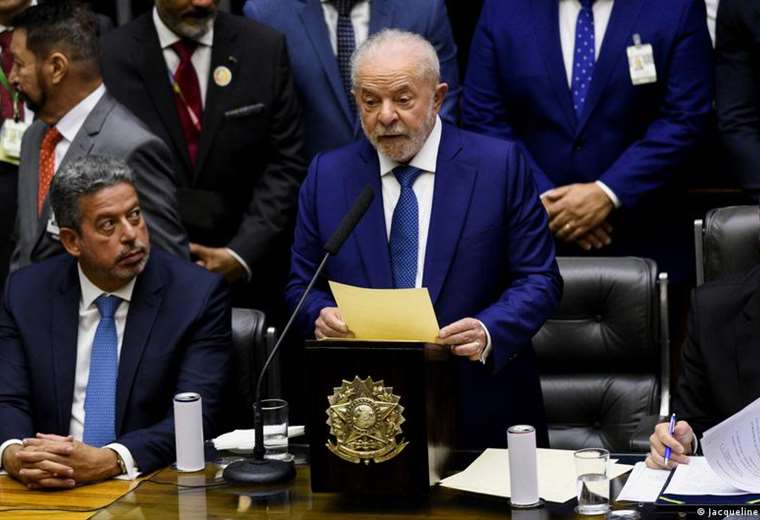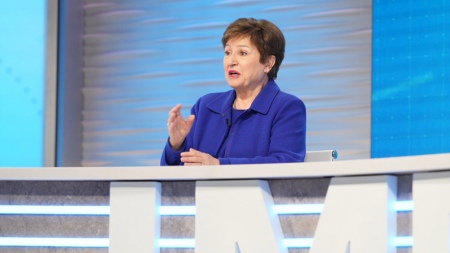January 1, 2023, 18:13 PM
January 1, 2023, 18:13 PM
The leftist Lula da Silva promised this Sunday to “rebuild” Brazil and reconcile to his compatriots by accessing the presidency for the third time, an inauguration marked by the absence of his predecessor, Jair Bolsonaro.
Exactly 20 years after coming to power for the first time, Luiz Inácio Lula da Silva, 77, was proclaimed president along with his vice president, Geraldo Alckmin, by pronouncing their “constitutional commitment” in the Brasilia Congress.
The ceremony began with a minute of silence in memory of former Brazilian star Pelé and Benedict XVI, both died this week at the ages of 82 and 95, respectively.
Dressed in a blue suit and tie, Lula promised in his first speech to “rebuild” the country on the “ruins” of Bolsonaro’s legacy.
“They emptied health resources, dismantled education, culture, science and technology, they destroyed the protection of the environment,” said Lula, who also reaffirmed his commitment to reduce deforestation in the Amazon to zero.
“It is not necessary to knock down any more trees,” said the president, assuring that this it will not stop us from supporting Brazil’s powerful agricultural sector.
Contrary to tradition, his predecessor was absent. Bolsonaro traveled to the United States on Friday, two days before the end of his government term.
The leftist was supported by about twenty heads of state, the largest number for a takeover in Brazil.
Among these are the leaders of Argentina, Chile, Colombia, Ecuador, Paraguay, Honduras and Uruguay, as well as the King of Spain, Felipe VI.
Washington sent Interior Secretary Deb Haaland, the first indigenous woman to form a cabinet in the United States, while Vice President Wang Qishan attended on behalf of China.
Chief Raoni in Bolsonaro’s place
Aboard the already traditional black Rolls Royce convertible, Lula later traveled with the first lady, the sociologist Rosangela da Silva “Janja”, to the presidential palace of Planalto, where a tide of supporters dressed in red, the color of his Workers Party.
In the absence of Bolsonaro, chief Raoni together with representatives of other minorities and popular classes of Brazil were in charge of handing him the presidential sash, a green and yellow silk ribbon embroidered in gold and diamonds, which Lula received without being able to hold back her tears.
“It is unacceptable that we continue to live with prejudice, discrimination and racism. We are a people of many colors and everyone should have the same rights,” he said.
one brazil
Lula addressed half of the electorate that did not vote for him in the runoff on October 30 (50.9% of the votes compared to 49.1% for Bolsonaro), a result that revealed a nation split in two.
“There are not two Brazils. We are a single country, a single people,” Lula said. “I am going to govern for the 215 million Brazilians (…) looking towards our bright future and not through the rear-view mirror of a past of division and intolerance,” he said.
“It was a wonderful speech, of reconciliation,” said Suellen Campos Leopoldo, a 33-year-old woman who traveled from Santa Catarina (south) with her husband to attend the ceremony.
This had an unprecedented security device, with thousands of agents deployed in the peaceful capital.
Preparations for the inauguration had been shaken after the arrest of a bolsonarista who planted an explosive near the Brasilia airport to provoke the declaration of a state of siege and thus avoid the assumption, according to his own confession.
Since the ballot, thousands of Bolsonaro supporters mobilized in various cities to reject the result at the polls and call for military intervention.
immediate challenges
The leftist president will face immediate challenges greater than those he has faced in his other two presidencies, which left him with an unusual popularity rating of 87%.
Some 30 million Brazilians go hungry and the economy is barely able to recover after the pandemic hit.
“In the first 100 days it will have to show what direction the government will take. The electoral victory was tight and will face a divided country with a fierce opposition. He needs to lead a government of pacification and national unity,” explained Leandro Consentino, a political scientist at the Insper institute in Sao Paulo.
The ex-unionist must conquer “credibility” on the management of public accounts in the face of a delicate fiscal situation, despite the fact that his campaign promises require an increase in spending to finance social programs, according to Consentino.
According to a survey by the Datafolha institute on Saturday, only 51% of Brazilians consider that Lula will govern better than Bolsonaro, reported the Folha de Sao Paulo newspaper.















